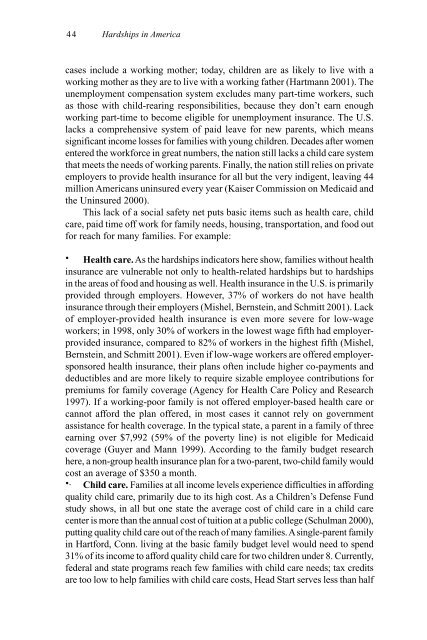You also want an ePaper? Increase the reach of your titles
YUMPU automatically turns print PDFs into web optimized ePapers that Google loves.
44 Hardships in America<br />
c<strong>as</strong>es include a working mother; today, children are <strong>as</strong> likely to live with a<br />
working mother <strong>as</strong> they are to live with a working father (Hartmann 2001). The<br />
unemployment compensation system excludes many part-time workers, such<br />
<strong>as</strong> those with child-rearing responsibilities, because they don’t earn enough<br />
working part-time to become eligible for unemployment insurance. The U.S.<br />
lacks a comprehensive system of paid leave for new parents, which means<br />
significant income losses for families with young children. Decades after women<br />
entered the workforce in great numbers, the nation still lacks a child care system<br />
that meets the needs of working parents. Finally, the nation still relies on private<br />
employers to provide health insurance for all but the very indigent, leaving 44<br />
million Americans uninsured every year (Kaiser Commission on Medicaid and<br />
the Uninsured 2000).<br />
This lack of a social safety net puts b<strong>as</strong>ic items such <strong>as</strong> health care, child<br />
care, paid time off work for family needs, housing, transportation, and food out<br />
for reach for many families. For example:<br />
· Health care. As the hardships indicators here show, families without health<br />
insurance are vulnerable not only to health-related hardships but to hardships<br />
in the are<strong>as</strong> of food and housing <strong>as</strong> well. Health insurance in the U.S. is primarily<br />
provided through employers. However, 37% of workers do not have health<br />
insurance through their employers (Mishel, Bernstein, and Schmitt 2001). Lack<br />
of employer-provided health insurance is even more severe for low-wage<br />
workers; in 1998, only 30% of workers in the lowest wage fifth had employerprovided<br />
insurance, compared to 82% of workers in the highest fifth (Mishel,<br />
Bernstein, and Schmitt 2001). Even if low-wage workers are offered employersponsored<br />
health insurance, their plans often include higher co-payments and<br />
deductibles and are more likely to require sizable employee contributions for<br />
premiums for family coverage (Agency for Health Care Policy and Research<br />
1997). If a working-poor family is not offered employer-b<strong>as</strong>ed health care or<br />
cannot afford the plan offered, in most c<strong>as</strong>es it cannot rely on government<br />
<strong>as</strong>sistance for health coverage. In the typical state, a parent in a family of three<br />
earning over $7,992 (59% of the poverty line) is not eligible for Medicaid<br />
coverage (Guyer and Mann 1999). According to the family budget research<br />
here, a non-group health insurance plan for a two-parent, two-child family would<br />
cost an average of $350 a month.<br />
·· Child care. Families at all income levels experience difficulties in affording<br />
quality child care, primarily due to its high cost. As a Children’s Defense Fund<br />
study shows, in all but one state the average cost of child care in a child care<br />
center is more than the annual cost of tuition at a public college (Schulman 2000),<br />
putting quality child care out of the reach of many families. A single-parent family<br />
in Hartford, Conn. living at the b<strong>as</strong>ic family budget level would need to spend<br />
31% of its income to afford quality child care for two children under 8. Currently,<br />
federal and state programs reach few families with child care needs; tax credits<br />
are too low to help families with child care costs, Head Start serves less than half



